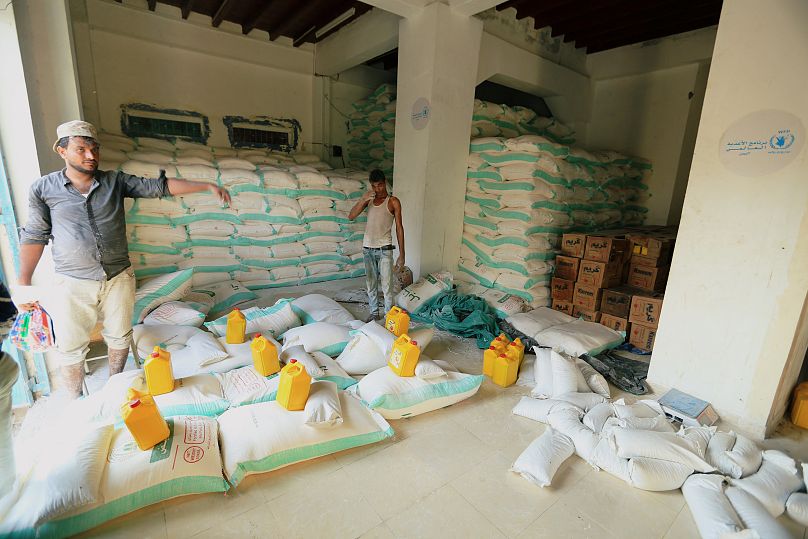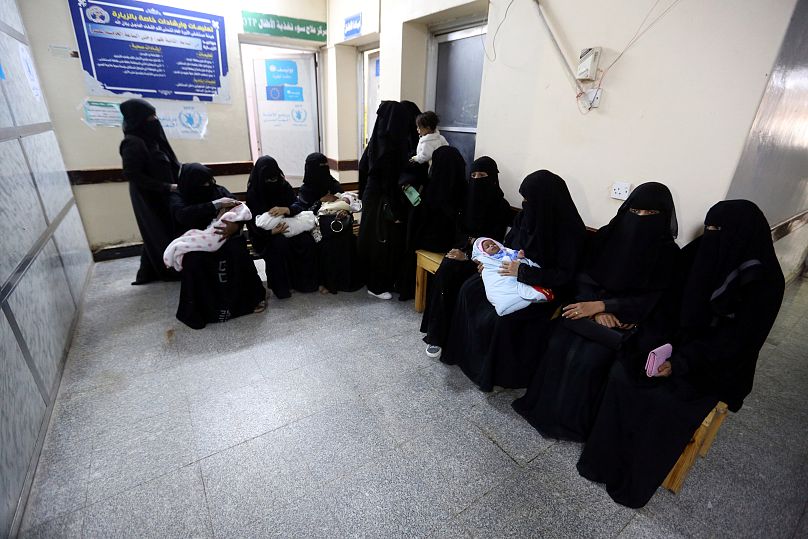Save the Children says up to 85,000 children under five may have died from hunger in Yemen since the outbreak of the civil war in 2015.
Suad is a mother-of-four based in Hodeida, Yemen - and faces the grim realities of what is reportedly the world's most severe humanitarian crisis.
 ADVERTISEMENT
ADVERTISEMENT
 ADVERTISEMENT
ADVERTISEMENT
Her 13-month-old son, Nusair, is suffering from malnutrition and dehydration. One night, when Nusair's health condition worsened, Suad had to take action.
"The airstrikes were hovering all that night. I went to my neighbours; they told me not to go, it was unsafe. I stayed until the morning then l reached the Health centre.
“I am scared of the war and worried we won’t have food. It is distressing,”
“I can’t go to sleep, it is torturing, and I am worried about my children. I couldn’t live if any harm came to them.”
An estimated 85,000 children under five may have died from extreme hunger of disease since the outbreak of Yemen’s war in 2015, an international aid group announced on Wednesday.
Save the Children analysed United Nations figures for untreated cases of severe and acute malnutrition and add that up to 14 million people are at risk of famine in the country.
“We are horrified that some 85,000 children in Yemen may have died because of extreme hunger since the war began,” Tamer Kirolos, Save the Children’s Country Director in Yemen, said.
“For every child killed by bombs and bullets, dozens are starving to death and it’s entirely preventable.”
“Children who die in this way suffer immensely as their vital organ functions slow down and eventually stop. Their immune systems are so weak they are more prone to infections with some too frail to even cry. Parents are having to witness their children wasting away, unable to do anything about it.”
Meritxell Relano, a UNICEF representative working on the ground in Yemen, told Euronews that she sees malnourished children daily.
“We have more than 400,000 cases of children suffering from severe acute malnutrition in the country," Relano said.
"This figure is enormous and is not comparable to what we have seen in other places."
Other aid workers and Save the Children have warned of the urgent need for high-nutrient foods in the country.
“More assistance is actually needed and it needs to be sustained,” said Stephen Anderson of the UN, speaking to Euronews from Yemen.
He warned that the issue of “peace and improving the economy and the purchasing power of the average Yemeni people” is also critical.
The Yemen conflict unfolded after a failed political transition following the Arab Spring that forced longtime president, Ali Abdullah Saleh, to hand over power in 2011.
Saleh's deputy Abed Rabbo Mansour Hadi took over but grappled with attacks by militant separatists, military support for Saleh, corruption, unemployment and food insecurity.
The Shia, Iran-backed, Houthis used Hadi's instability to its advantage by seizing control of various areas across Yemen - forcing him to flee in March 2015.
Saudi Arabia and eight other mostly Sunni Arab states began an air campaign to restore Hadi's government and the coalition is reported to have received logistical and intelligence support from the US, UK and France.
In recent weeks, Save the Children said it has observed increased military airstrike activity in the key port of Hodeidah. Since then, aid imports have decreased by more than 55,000 metric tons a month.
Increased fighting has also been reported in Taiz, Saada and Sanaa.
The organisation said the fighting, blockades and bureaucracy has resulted in delays in aid reaching people.
“It can take up to three weeks for aid to reach people instead of the week it would take if Hodeidah port was fully operational,” Save the Children said in a statement.
The UN said the coalition and the Houthis have agreed to attend peace talks at the end of November after a previous attempt in September failed.
A ceasefire resolution was presented to the UN security council on Monday, although a vote has not yet been scheduled.
Many western governments have been criticised by rights groups for supporting the Saudi-led coalition.












